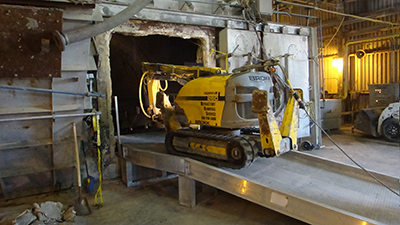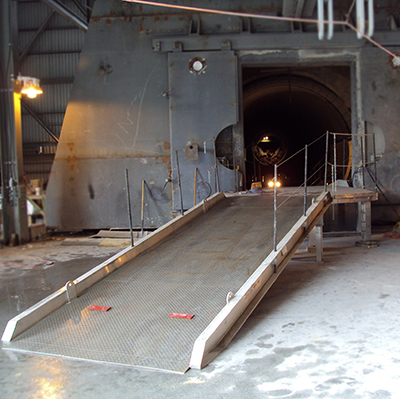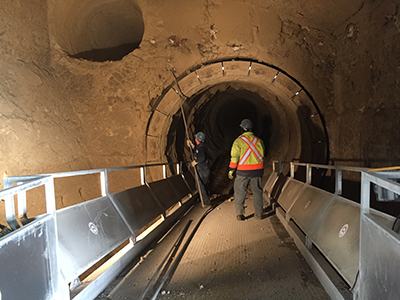There’s No Denying The Impact Access Ramps Have On Both Productivity And Safety.
By Heather Harding



When it comes to efficient kiln maintenance, there’s no denying the impact access ramps have on both productivity and safety. However, purchasing specialty equipment is often a difficult decision.
Plant managers must always keep a close eye on the bottom line, and specialized equipment, like kiln access ramps, might sometimes be a hard sell. In-house production of a ramp may appear cost efficient on the surface, but poor design and lengthy installation tends to lead to higher long-term costs. For a better return on investment, many facilities are partnering with an original equipment manufacturer (OEM).
Customized Designs
One of the biggest benefits of working with an OEM is their experience and the quality received. These companies have worked with hundreds of customers to solve specific challenges and, in partnering with them, plant managers tap into that knowledge and success to find the solution that best fits their individual site. Each burn floor presents unique obstacles. Because of this, each access ramp is specially designed to ensure a proper fit.
In addition, OEMs have access to unique materials not found in-house. For example, a custom-manufactured ramp could be fabricated with high-strength 6061 T6 aluminum, making it as strong and durable as steel but at half the weight. Ramps made from this material will support as much as 15,000 lb. (6,804 kg) live load and offer a 3:1 safety factor.
For added safety, many manufactured ramps come with standard features such as curbs, fall guards and articulated landing feet to ensure the ramp is always sitting properly in the kiln. Optional safety cages, personnel tunnels and accessories that make ramps compatible with third-party demolition equipment are also available from these manufacturers.
Easy Installation
Another benefit of working with lighter, sturdier custom-manufactured ramps is an ease of installation not achievable with most in-house models. By using industrial lightweight aluminum and a modular design, these ramps can be assembled in as little as 1.5 hours depending on ramp length and burn floor configuration.
That’s 40% less time than most alternative aftermarket or self-built ramps. Most manufactured ramp assemblies are easily maneuvered by basic equipment like a forklift and don’t require specialty equipment like hoist systems required for steel ramps.
Continued Support
One of the biggest benefits of partnering with a specialized manufacturer is the customized care provided by a dedicated sales and service department over the life of the ramp. When a do-it-yourself ramp falters, diagnosing the problem eats away at valuable time. Working with an OEM means having a partner to keep downtime to a minimum.
Their experience allows them to respond quickly and offer solutions that keep maintenance projects on schedule. Working with these companies also provides access to aftermarket services, such as ramp inspections, spare parts and any safety modifications that might arise from continued safety testing.
Long-Term Results
The benefits of working with an OEM quickly add up to a better ROI. Custom manufacturers offer safe, efficient solutions for routine maintenance and allow plant managers to apply time and resources more effectively somewhere else.
Heather Harding is the managing director for Bricking Solutions.



